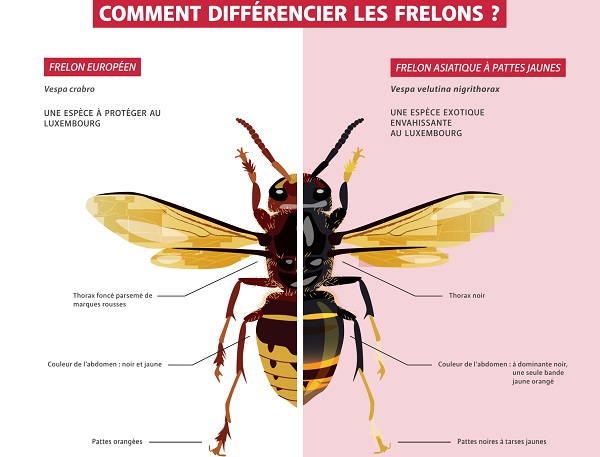 Differences between European hornets and Asian hornets;
Credit: Nature & Forest Agency (ANF)
Differences between European hornets and Asian hornets;
Credit: Nature & Forest Agency (ANF)
Luxembourg's Nature and Forest Agency and the Ministry of Health and Social Security have published advice on adopting the "right reflexes" when faced with Asian (yellow-legged) hornets (Vespa velutina).
The authorities noted that Asian hornets are particularly active as summer comes to a close. On the one hand, such hornets may be encountered feeding on the flesh of ripe fruit and near the flowers of climbing ivy. On the other hand, it is during these weeks that the colonies raise their queens for the following season. The Asian hornet is an invasive alien species (IAS), which must be controlled in order to limit its spread and reduce the damage caused to native species. As such, the Nature and Forestry Agency has called on the public to report nests.
An Asian hornet nest can house up to 2,000 hornets. In order to avoid being stung, people should keep their distance from the nests. ALthough they are not particularly aggressive by nature, Asian hornets can feel threatened when someone approaches their nest. This could lead to a potentially dangerous attack by a large number of hornets trying to defend their nest. The authorities stressed that people should "under no circumstances" remove nests on their own initiative; a specialist must first determine the species and then professionally remove the nest. As such, it is important that the public report any nests discovered with a photo and their location to neobiota@anf.etat.lu or via the iNaturalist application.
In terms of identifying the species, the Asian hornet is characterised by a black head with a yellow-orange front, a dark brown to black body with only the fourth section of the abdomen being yellow and black legs with yellow ends (tarsi). In contrast, the European hornet (Vespa crabro) has a reddish body and legs and a mostly yellow abdomen.
The authorities also noted that during grape harvests or fruit picking, isolated Asian hornets may appear when feeding on ripe fruit. In these cases, there is a risk of stinging if a hornet feels threatened. However, the sting of the Asian hornet is neither more dangerous nor more painful than that of the European hornet. In most cases, a sting is benign. In the event of complications due to a sting, the affected individual is advised to consult a doctor. The pain caused can last up to six days. In very rare cases, a sting can cause a severe allergic reaction (anaphylactic shock). Anyone experiencing signs of anaphylactic shock (sudden drop in blood pressure, hives, nausea and vomiting, shortness of breath, rapid or weak pulse, etc.), should call the 112 emergency number immediately.








